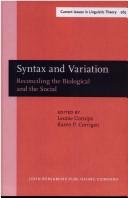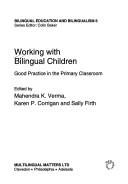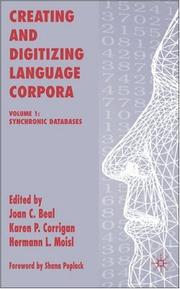| Listing 1 - 10 of 13 | << page >> |
Sort by
|
Book
ISBN: 0748671447 1282620215 9786612620218 0748634304 9780748634309 0748634282 9780748634286 0748634290 9780748634293 Year: 2010 Publisher: Edinburgh : Edinburgh University Press,
Abstract | Keywords | Export | Availability | Bookmark
 Loading...
Loading...Choose an application
- Reference Manager
- EndNote
- RefWorks (Direct export to RefWorks)
This book focuses on the sociolinguistic consequences of historical contact between indigenous Irish peoples and newer English and Scottish settlers in what is now the territory of Northern Ireland (NI). The contact varieties that resulted represent the oldest L2 'Englishes' globally. Moreover, the degree of admixture from English, Irish and Scots in the contemporary dialects of NI reflects various external forces. Naturally, these varieties share certain structural features with sister Celtic Englishes and indeed with other vernacular Englishes globally. However, there are other linguistic tr
Book
ISBN: 3110611570 3110614197 9783110614190 9783110611571 9783110611472 3110611473 Year: 2020 Publisher: Berlin Boston
Abstract | Keywords | Export | Availability | Bookmark
 Loading...
Loading...Choose an application
- Reference Manager
- EndNote
- RefWorks (Direct export to RefWorks)
This inter-disciplinary book is the first in an Irish context to address issues connected with the ‘super-diversifying’ of language and society engendered by recent and historical migrations. It analyses novel data from interviews with allochthonous and autochthonous groups of monolingual and plurilingual youngsters living in Northern Ireland. A key aim is to test models within second language acquisition and language variation and change research. Another goal is to examine the extent to which distinctive migratory trends generated changes in the language ecologies of communities on the island of Ireland as well as globally in regions where the Irish settled intensively from the 1700s. The book also compares contemporary migratory experiences with historical records to further our understanding of the dynamics of identification through language across time. The first-ever book devoted to all aspects of the sociolinguistics of globalization and migration in Northern Ireland will be welcomed by scholars interested in the consequences for ethnolinguistic vitality of large-scale population movements. It could not be more timely given the fact that 2.5 million sought asylum in Europe alone during 2016, greatly enhancing its diversity.
Digital
ISBN: 9780748634309 Year: 2010 Publisher: Edinburgh Edinburgh University Press
Abstract | Keywords | Export | Availability | Bookmark
 Loading...
Loading...Choose an application
- Reference Manager
- EndNote
- RefWorks (Direct export to RefWorks)
Multi
ISBN: 9780748634309 9780748634286 9780748634293 0748634290 0748634282 Year: 2010 Publisher: Edinburgh: Edinburgh University Press,
Abstract | Keywords | Export | Availability | Bookmark
 Loading...
Loading...Choose an application
- Reference Manager
- EndNote
- RefWorks (Direct export to RefWorks)
Digital
ISBN: 9783110614190 9783110611571 9783110611472 Year: 2020 Publisher: Berlin ;; Boston De Gruyter Mouton
Abstract | Keywords | Export | Availability | Bookmark
 Loading...
Loading...Choose an application
- Reference Manager
- EndNote
- RefWorks (Direct export to RefWorks)
Book
ISBN: 1137386444 1137386452 Year: 2016 Publisher: London : Palgrave Macmillan UK : Imprint: Palgrave Macmillan,
Abstract | Keywords | Export | Availability | Bookmark
 Loading...
Loading...Choose an application
- Reference Manager
- EndNote
- RefWorks (Direct export to RefWorks)
This book unites a range of approaches to the collection and digitization of diverse language corpora. Its specific focus is on best practices identified in the exploitation of these resources in landmark impact initiatives across different parts of the globe. The development of increasingly accessible digital corpora has coincided with improvements in the standards governing the collection, encoding and archiving of ‘Big Data’. Less attention has been paid to the importance of developing standards for enriching and preserving other types of corpus data, such as that which captures the nuances of regional dialects, for example. This book takes these best practices another step forward by addressing innovative methods for enhancing and exploiting specialized corpora so that they become accessible to wider audiences beyond the academy. Karen P. Corrigan is Professor of Linguistics and English Language at Newcastle University. She has previously lectured at University College, Dublin and the Universities of Edinburgh and York (UK). She co-edited the two previous volumes in this collection and is author of Irish English, Volume 1: Northern Ireland (2010). Adam Mearns is Lecturer in the History of the English Language at Newcastle University. He has previously taught at the Universities of Sheffield and Leeds and at Northumbria University. Recent publications have focused on the dialect of Tyneside and the concept of the supernatural in Old English.
Linguistics. --- Sociolinguistics. --- Corpora (Linguistics) --- Computational linguistics. --- Automatic language processing --- Language and languages --- Language data processing --- Linguistics --- Natural language processing (Linguistics) --- Corpus-based analysis (Linguistics) --- Corpus linguistics --- Data processing --- Applied linguistics --- Cross-language information retrieval --- Mathematical linguistics --- Multilingual computing --- Linguistic analysis (Linguistics) --- Language and society --- Society and language --- Sociology of language --- Language and culture --- Sociology --- Integrational linguistics (Oxford school) --- Social aspects --- Sociological aspects
Digital
ISBN: 9781137386458 Year: 2016 Publisher: London Palgrave Macmillan UK :Imprint: Palgrave Macmillan
Abstract | Keywords | Export | Availability | Bookmark
 Loading...
Loading...Choose an application
- Reference Manager
- EndNote
- RefWorks (Direct export to RefWorks)
This book unites a range of approaches to the collection and digitization of diverse language corpora. Its specific focus is on best practices identified in the exploitation of these resources in landmark impact initiatives across different parts of the globe. The development of increasingly accessible digital corpora has coincided with improvements in the standards governing the collection, encoding and archiving of ‘Big Data’. Less attention has been paid to the importance of developing standards for enriching and preserving other types of corpus data, such as that which captures the nuances of regional dialects, for example. This book takes these best practices another step forward by addressing innovative methods for enhancing and exploiting specialized corpora so that they become accessible to wider audiences beyond the academy. Karen P. Corrigan is Professor of Linguistics and English Language at Newcastle University. She has previously lectured at University College, Dublin and the Universities of Edinburgh and York (UK). She co-edited the two previous volumes in this collection and is author of Irish English, Volume 1: Northern Ireland (2010). Adam Mearns is Lecturer in the History of the English Language at Newcastle University. He has previously taught at the Universities of Sheffield and Leeds and at Northumbria University. Recent publications have focused on the dialect of Tyneside and the concept of the supernatural in Old English.
Sociolinguistics --- Linguistics --- co-creation --- big data --- linguïstiek --- sociolinguïstiek

ISBN: 902724779X 1588116409 9786612156670 1282156675 9027294380 9789027294388 9789027247797 9781588116406 Year: 2005 Volume: 265 Publisher: Philadelphia : John Benjamins,
Abstract | Keywords | Export | Availability | Bookmark
 Loading...
Loading...Choose an application
- Reference Manager
- EndNote
- RefWorks (Direct export to RefWorks)
The papers in this collection share a common interest in the empirical, theoretical and meta-theoretical aspects of the 'internal-external' ('formal-functional') debate in linguistic theory. The primary aim of this volume is to initiate cooperation between internationally renowned generative and variationist linguists with a view to developing an innovative and more cohesive approach to syntactic variation. The present volume contains treatments incorporating the analysis of external factors into accounts focusing on the internal linguistic conditioning of syntactic variation and change cross-linguistically. As such, it offers novel approaches to three key areas of current linguistic debate, viz. (1) Methodological practices, (2) Theoretical applications and (3) Modularity. The volume is, therefore, an important achievement for the progress of linguistic theory more generally and it is an even more crucial milestone in the coming-of-age of 'Socio-Syntax' as a discipline in its own right.
Grammar, Comparative and general --- Syntax. --- Language and languages --- Syntaxe --- Variation (Linguistique) --- Variation. --- Characterology of speech --- Language diversity --- Language subsystems --- Language variation --- Linguistic diversity --- Variation in language --- Syntax --- Variation --- Linguistics --- Philology --- Grammar, Comparative and general Syntax

ISBN: 0585199477 9780585199474 1853592943 1853592935 9781853592942 9781853592935 Year: 1995 Volume: 6 Publisher: Clevedon: Multilingual matters,
Abstract | Keywords | Export | Availability | Bookmark
 Loading...
Loading...Choose an application
- Reference Manager
- EndNote
- RefWorks (Direct export to RefWorks)
Language and languages --- Children of minorities --- Bilingualism in children --- Education, Primary --- Education, Bilingual --- English language --- Minority children --- Minority group children --- Minorities --- Foreign languages --- Languages --- Anthropology --- Communication --- Ethnology --- Information theory --- Meaning (Psychology) --- Philology --- Linguistics --- Germanic languages --- Children --- Study and teaching (Primary) --- Bilingual method. --- Education (Primary) --- Foreign speakers. --- Bilingualism --- Multilingual education --- Language and languages - Study and teaching (Primary) - Bilingual method. --- Children of minorities - Education (Primary) - Great Britain. --- Bilingualism in children - Great Britain. --- Education, Primary - Great Britain. --- Education, Bilingual - Great Britain. --- English language - Study and teaching (Primary) - Foreign speakers. --- English language - Study and teaching (Primary) - Great Britain.

ISBN: 9781403943668 1403943664 1403943672 9781403943675 1349522333 9786611360313 1281360317 0230223931 134952235X 9786611360283 1281360287 0230223206 Year: 2007 Publisher: Basingstoke Palgrave Macmillan
Abstract | Keywords | Export | Availability | Bookmark
 Loading...
Loading...Choose an application
- Reference Manager
- EndNote
- RefWorks (Direct export to RefWorks)
A range of electronic corpora has become increasingly accessible via the WWW and CD-ROM. This development coincided with improvements in the standards governing the collecting, encoding and archiving of such data. Less attention, however, has been paid to making other types of digital data available. This is especially true of that which one might describe as 'unconventional', namely, dialects, child language and bilingual databases. This book is a first step toward developing similar standards for enriching and preserving these neglected resources.
#KVHA:Taalkunde --- #KVHA:Corpuslinguïstiek --- #KVHA:Computerlinguïstiek --- Computational linguistics.
| Listing 1 - 10 of 13 | << page >> |
Sort by
|

 Search
Search Feedback
Feedback About UniCat
About UniCat  Help
Help News
News